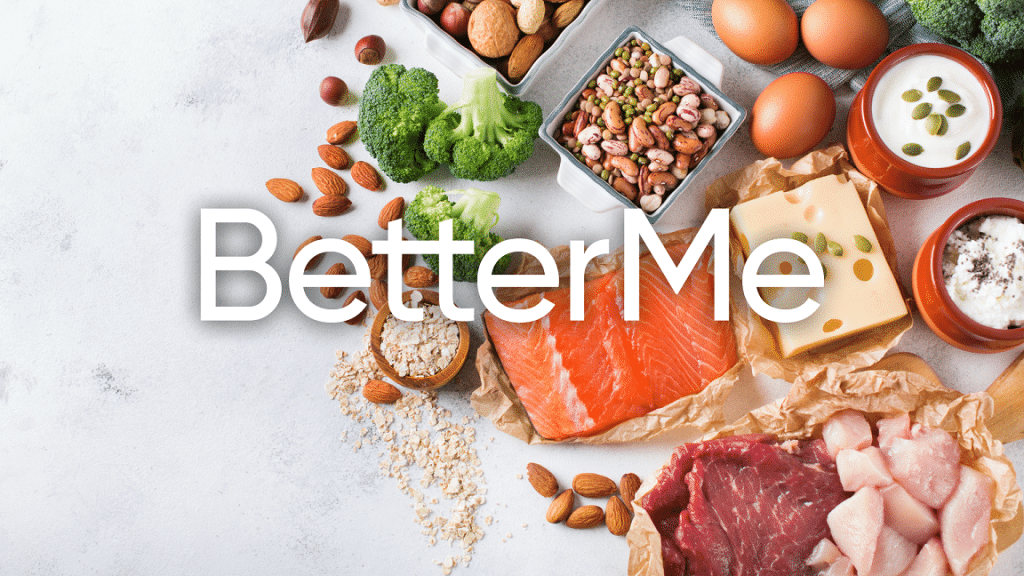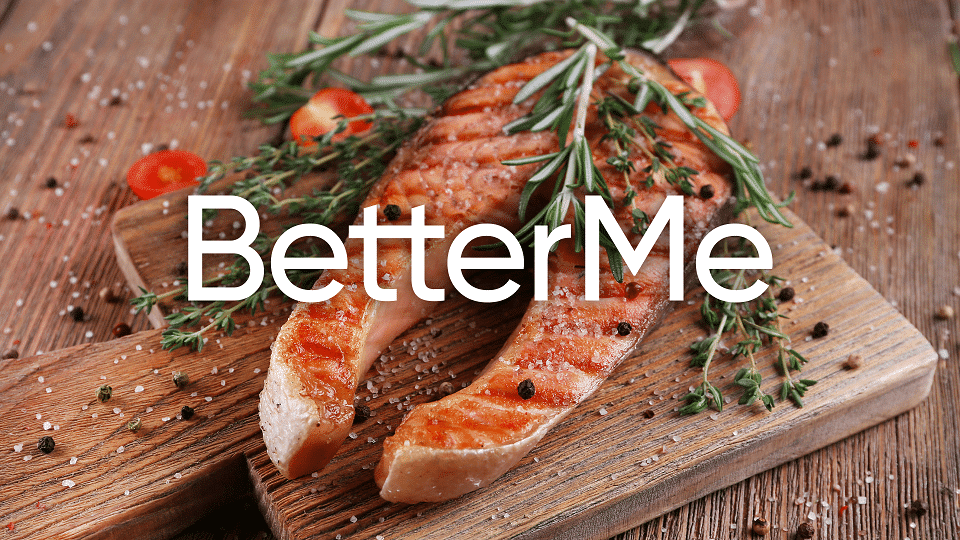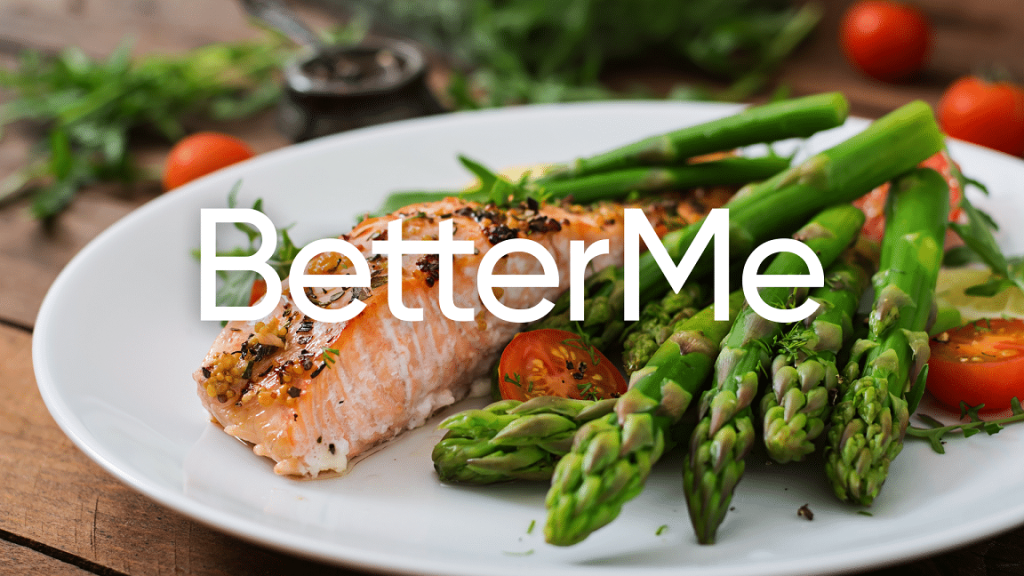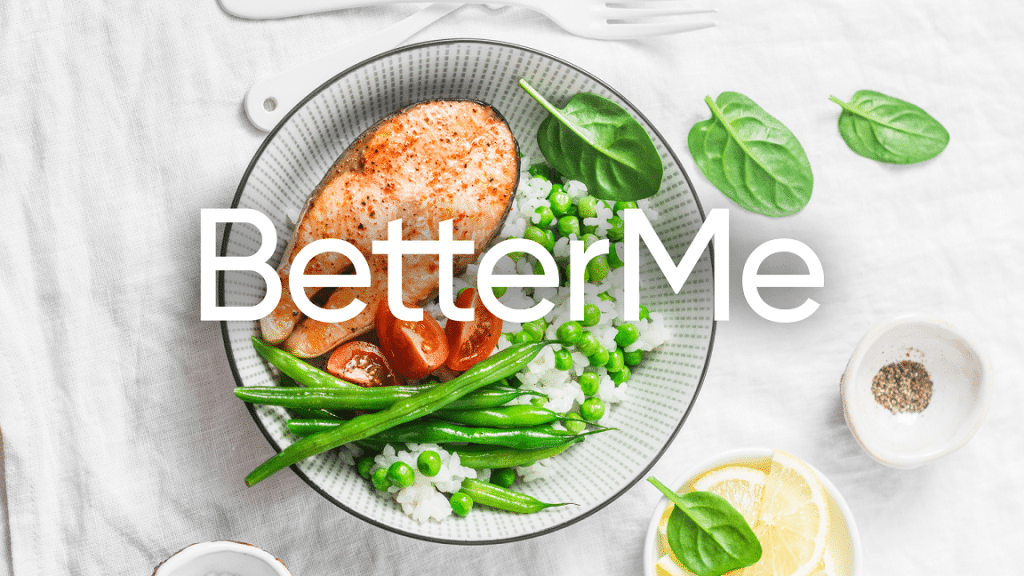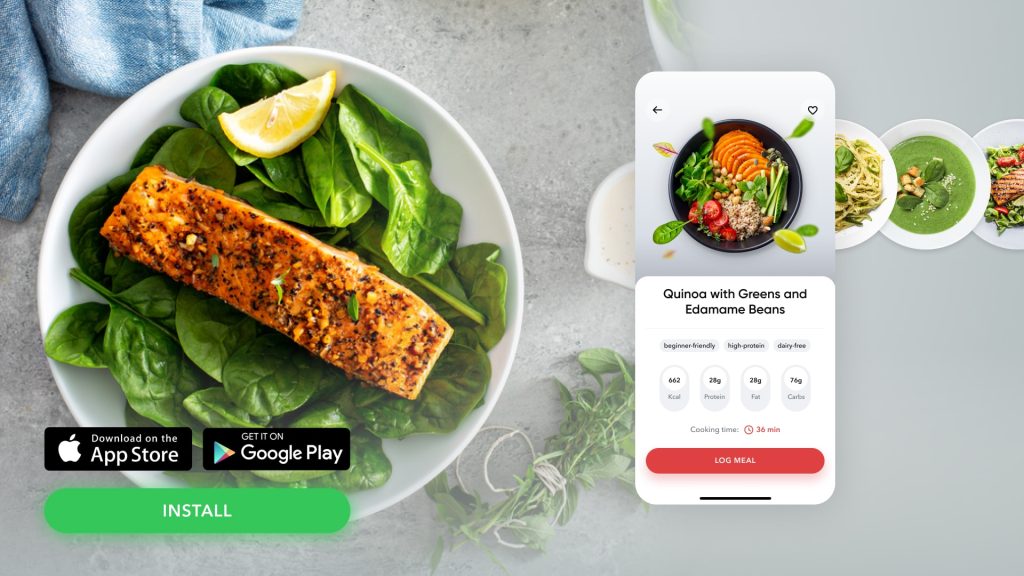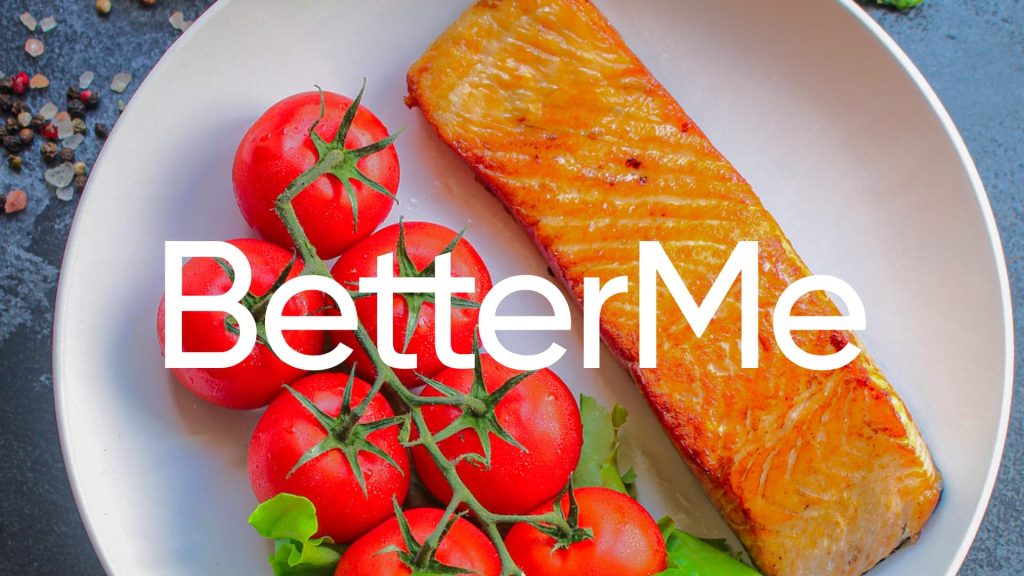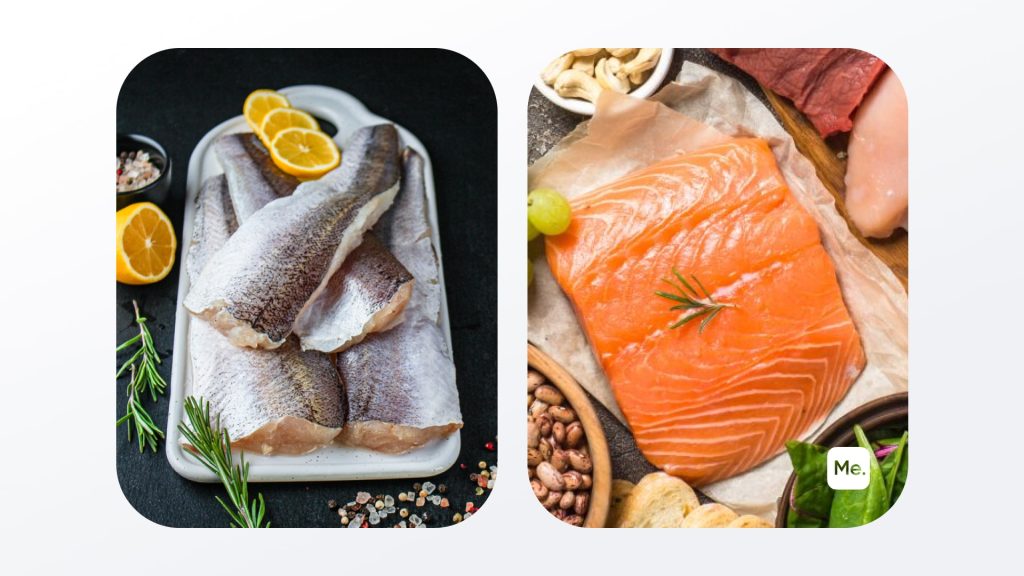Salmon is an excellent source of protein, omega-3 fatty acids and healthy fats. These are good reasons why people incorporate it into their diet. Despite this, salmon has found itself on the list of foods that dieters are unsure about when it comes to weight loss. Is salmon good for weight loss? This read will discuss the link between salmon and weight. It will also shed light on salmon’s nutritional information and health benefits, plus recommend a few delicious salmon recipes. Let us get started!
Get your personalized
meal plan!
What Is Salmon?
Salmon is a silver-colored fish that is found in rivers and the ocean. It swims up rivers from the ocean to lay its eggs. There are several species of salmon. The most common one is the Atlantic salmon.
You can also find species like Coho, Pink, Masu, Amago, Chum, Chinook, and Sockeye (4). It so happens that quite a few people are intrigued by the numerous ways one can cook salmon that they overlook its nutritional benefits.
Nutritional Information Of Salmon
There is a wide range of nutrients that are linked to salmon. These nutrients either help the body perform various roles efficiently or help strengthen it. Note that the nutritional information of salmon may vary depending on multiple factors. These include the type of salmon you use, the portion size and the preparation method.
With that in mind, do not get your calorie count wrong by using the same calorie count for different salmon recipes. The USDA Nutrient Database states that three ounces or roughly 85 grams of cooked Atlantic salmon have the following nutrients (8):
- Calories- 175
- Carbohydrate- 0 g
- Protein- 18.79 g
- Fat- 10.5 g
If you were to prepare 85 grams of wild salmon, the nutritional information would significantly change. The USDA Nutrient database lists the following nutrients in wild salmon (8):
- Calories- 118
- Carbohydrate- 0 g
- Total fat- 3.65 g
- Protein- 19.93 g
If you love salmon fillets, then you take a look at the nutritional information, including the calories in salmon fillets of a 100 g serving (8):
- Calories- 232
- Protein- 19 g
- Fat- 15. 49 g
- Carbohydrate- 0 g
Read More: Is Raw Salmon Good For You?
Health Benefits Of Salmon
Salmon is a rich fish and is the healthiest fish to eat as recommended by food experts. Eating salmon has a wide array of health benefits, which include:
-
Packing Your Body With Nutrients
Salmon is an excellent source of essential nutrients that your body needs to perform various tasks. It can provide your body with the following nutrients:
- Vitamin B-12. This vitamin is essential in preventing vitamin B-12 deficiency, which may lead to a reduced red blood cell count and increase the risk of anemia.
- Potassium. Potassium is a crucial mineral in reducing the risk of conditions like stroke, heart diseases, cancer, arthritis, digestive disorders, and infertility (7).
- Omega-3 Fatty Acids. There is strong evidence that salmon contains omega-3 fatty acids, which are very beneficial to the body. They help reduce inflammation, a condition that damages your blood vessels and leads to cardiovascular disease and stroke (6).
- Protein. Protein is essential in our body as it helps build and maintain muscle mass. This makes salmon one of the must-haves in a muscle building diet plan.
- Iron. Salmon also contains iron that is an essential nutrient for blood production. It is crucial for women who are trying or are pregnant.
- Selenium. Selenium is an essential mineral as it is associated with many body functions. Some of these include improving cognition, fertility, and immune system functioning.
- Vitamin D. Vitamin D is crucial in the body as it helps regulate calcium and maintain healthy phosphorus levels in the blood.
- Vitamin E. Salmon is also rich in vitamin E, which supports immune functioning, promotes eye health, reduces cancer risk, and prevents coronary heart disease and inflammation (10).
- Vitamin B-5. The body needs vitamin B-5 as it helps produce energy by breaking down carbs and fats. It also promotes healthy hair, skin, liver, and eyes.
- Improved Heart Health
Salmon contains essential nutrients like potassium and omega-3 fatty acids, so it is possibly the best fish to eat for your heart. The combination of these two boosts your heart health in various ways. This is through (4):
- Reduced artery inflammation
- Prevention of excess fluid retention
- Reduced cholesterol levels
- Regulated blood pressure
- Reduced risk of heart attacks, high blood pressure, stroke, high triglycerides, and abnormal heartbeat (arrhythmia)
A healthy heart means your heart functions efficiently, has a reduced risk of high blood pressure, stroke, and heart disease, and improves overall health (4).
-
Reduced Thyroid Disease Risk
Selenium is one of the essential nutrients for healthy thyroid functioning (5). You need to maintain a healthy thyroid as it helps with body roles like metabolism, mood, and energy regulation (3).
As seen from the nutritional information of salmon from above, it does contain selenium. However, Medical News Today acknowledges that thyroid disease is hardly present among people who eat salmon regularly (3).
If you’ve mustered up the courage to crush your weight loss goal, let Betterme take the sting out of this demanding process. Our app will help you restructure your habits, remold your life and crank up your fitness results!
-
Supports Bone Health
We all need calcium and vitamin D for strong, healthy bones. Salmon is an excellent source of these two nutrients. Since your body cannot make calcium, you need to acquire it from foods rich in it, like calcium (4). Vitamin D helps your body to absorb calcium (4).
-
Improved Mental Well-Being
Salmon has also been found to benefit the brain and the cognitive process (11). In addition, according to Medical News Today, recently conducted research links salmon consumption with a reduced risk of affective disorders like depression (11).
Polyunsaturated fats found in fish have also been linked to reduced risk of psychoses, dementia, cognitive deficits, and hyperkinetic disorders like ADHD (3). Research also links omega-3 fatty acids found in salmon to a decrease in impulsivity, aggression, and depression in adults (11).
Medical News Today acknowledges that salmon consumption effectively reduces mood disorders in children aged four to twelve years (11). The most known mood disorder positively affected by salmon is attention deficit hyperactivity disorder (ADHD) (11).
Still, on improved mental well-being, a long-term investigation conducted in the U.K. discovered that salmon consumption by pregnant women had many benefits to the unborn child. For example, the research indicated that pregnant women who consumed a minimum of twelve ounces of fish weekly had children with higher IQs and better communication, social, and fine motor skills (11).
Is Salmon Good For Weight Loss?
If you are worried that eating salmon compromises your weight loss efforts, we are here to tell you that it won’t. In addition to the discussed benefits above, consuming salmon has also been linked to weight loss.
Now, here is a trick. You consume salmon, and after a day or two, you have cut some pounds. Sadly, that is not how salmon promotes weight loss. Instead, salmon contributes to steady and healthy weight loss in the following ways:
-
By Packing Your Body With Protein
Although most people may not know it, protein does influence weight loss. Protein is required for the development and maintenance of muscle mass. The more muscle you have, the more calories you burn, even when resting (3).
However, experts do advise you to take it slow with your weight loss journey. If you lose weight too fast, WebMD reveals that you lose more muscle than when you lose excess weight more slowly (3). So, focus on steady and healthy weight loss instead of rapid weight loss.
Like any other protein food, consuming salmon helps regulate hormones that control your appetite and increase satiety. As a result, you eat until you are full and not beyond this. Similarly, eating protein-rich foods like salmon has been linked to an increased metabolic rate (9). An increased metabolic rate means your body is burning calories faster, even when resting (9).
Read More: Pescatarian Meal Plan: Why This Fish-Centric Diet Is Exactly What The Doctor Ordered
-
By Substituting Unhealthy Fats With Healthy Ones
Unhealthy fats are among the primary culprits for unwanted weight gain. You receive such fats from fried foods like chips or chicken nuggets or packaged snack foods like crackers. In addition to weight gain, these foods have been linked to increased cholesterol levels and heart disease risks.
Salmon can help you ditch these unhealthy fats and in return give you healthy fats associated with numerous health benefits. These include reduced cholesterol, blood pressure, triglycerides levels, and stroke and heart disease risk (11).
Likewise, Medical News Today acknowledges that healthy fats can help promote weight loss by increasing satiety (11). Consuming these fats make you feel full longer, limiting the chances of overeating.
Evidence For Weight Loss
The link between salmon and weight loss began with a 2010 study conducted among obese European men and women. The study’s aim was to identify the effects of seafood consumption among these participants during eight weeks of energy restriction (2).
After the study was conducted, results taken and interpreted, the evidence indicated that salmon consumption was most effective in weight loss compared to other types of seafood (2). Now, back to our question: is salmon good for weight loss?
Based on scientific evidence, it may not be just good but instead be the best type of seafood to consume for weight loss. However, check first with your doctor and nutritionist before adding this food to your diet.
Reasons why BetterMe is a safe bet: a wide range of calorie-blasting workouts, finger-licking recipes, 24/7 support, challenges that’ll keep you on your best game, and that just scratches the surface! Start using our app and watch the magic happen.
Healthy Salmon Recipes
One of the most assuring things for dieters following a weight loss diet plan is knowing that their meal plan has foods that promote weight loss. One of such foods is salmon. There are many ways you can add salmon to your diet and still get the most of its benefits. Some of these include (5):
- By using it as your main protein source.
- By adding it to rice or pasta dishes.
- By mincing this protein and using it to top salads.
- By substituting salads like chicken salad for salmon salad.
- By using it to make salmon burgers or patties.
It would be best if you compiled more salmon weight loss recipes with the help of your nutritionist. Here are some famous delicious dishes that you can try to spice your weight loss journey (5):
- Sesame salmon, purple sprouting broccoli and sweet potato mash (Calories- 463, Fat- 22 g, Carbs- 29 g, and Protein- 32 g).
- Wild salmon veggie bowl (Calories- 395, Fat- 17 g, Carbs- 18 g, and Protein- 39 g).
- Sticky seeded salmon with Satsuma salad (Calories- 473, Fat- 28 g, Carbs- 20 g, and Protein- 35 g).
- Toasted quinoa, lentil, and poached salmon salad (Calories- 302, Fat- 12 g, Carbs- 25 g, and Protein- 24 g).
- Salmon noodle soup (Calories- 265, Fat- 10 g, Carbs- 27 g, and Protein- 19 g).
- Zingy salmon and brown rice salad (Calories- 497, Fat- 15 g, Carbs- 61 g, and Protein- 34 g).
- Salmon with new potato and corn salad and basil dressing (Calories- 434, Fat- 24 g, Carbs- 28 g, and Protein- 30 g).
- Pan-fried salmon with watercress, polenta croutons and capers (Calories- 367, Fat- 22 g, Carbs- 13 g, and Protein- 31 g).
- Mustard-crusted salmon with celeriac mash (Calories- 463, Fat- 22 g, Carbs- 29 g, and Protein- 32 g).
- Teriyaki salmon with sesame pak choi (Calories- 517, Fat- 30 g, Carbs- 17 g, and Protein- 41 g).
If you would love roasted, grilled or baked salmon dishes, then take a look at the following (5):
- Salmon baked with herbs and caramelized lemons (Calories- 388, Fat- 29 g, Carbs- 1 g, and Protein- 32 g).
- Mustard salmon and veg bake with horseradish sauce (Calories- 587, Fat- 38 g, Carbs- 31 g, and Protein- 30 g).
- Baked salmon with fennel and tomatoes (Calories- 398, Fat- 25 g, Carbs- 5 g, and Protein- 37 g).
- One-pan roast salmon with leeks, onions and parsley dressing (Calories- 712, Fat- 48 g, Carbs- 19 g, and Protein- 47 g).
- Roast salmon with peas, potatoes and bacon (Calories- 548, Fat- 29 g, Carbs- 24 g, and Protein- 48 g).
- Salmon with warm chickpea, pepper, and spinach salad (Calories- 481, Fat- 25 g, Carbs- 26 g, and Protein- 39 g).
- Grilled salmon teriyaki with cucumber salad (Calories- 340, Fat- 18 g, Carbs- 18 g, and Protein- 27 g).
- Grilled salmon salad with watercress yogurt dressing (Calories- 341, Fat- 18 g, Carbs- 14 g, and Protein- 31 g).
Although these dishes seem irresistible. However, there are some critical points you need to be familiar with before preparing any of these. The first point to take more of is cleanliness. Cleanliness is paramount when you are preparing salmon to reduce the risk of bacteria (4).
WebMD states that it is very easy for bacteria to spread to your fish if your working area is dirty (4). So, make sure you keep everything tidy, from your hands, chopping board, to the utensils you use.
Secondly, food experts also warn you to be extra cautious when you are buying your salmon. Fresh fish should not have that strong ‘fishy’ smell. Instead, it should be mild and appear fresh (4). Opt for refrigerated fish to also reduce contamination and infection risk.
The third thing you need to take note of is its storage. Never leave your salmon or any other seafood, in that case, at room temperature for over two hours (4). Again, talk to your nutritionist for insight on how to store salmon, depending on how you cooked it.
You also need to take note of the cooking method. There are different ways you can cook your salmon. You are advised to opt for healthier cooking methods because you are still on a weight loss journey.
So, cooking methods like deep frying are out of the picture. They only increase your calorie count because of the excessive fat and calories. WebMD also reveals that frying can be a bad cooking choice because it makes your salmon seal in pollutants already present in the fish (4).
Remember to talk to your doctor before consuming salmon to verify that you don’t have a seafood allergy. You can suddenly develop a seafood allergy in adulthood or any other age, which is why you need to seek consultation first.
What Is The Best Salmon Serving?
Although salmon has been linked to weight loss and numerous health benefits, you are asked to consume it in moderation. So, the FDA does rank salmon among the best fish choices and recommends having two servings in a week (1).
The FDA further states that one serving should be equivalent to four ounces in adults (1). For children, you can only serve one ounce at age two and increase with age. They can only consume four ounces when they are eleven years old (1).
However, if you are pregnant or breastfeeding, the FDA suggests consuming between eight and twelve ounces of salmon and other fish varieties (1). As always, you need to talk to your nutritionist before adding anything to your diet plan.
The Bottom Line
Is salmon good for weight loss? Scientific evidence shows that it is. It promotes weight loss by providing you with protein that increases satiety and muscle mass and healthy fats that make you feel full for longer. Please talk to your doctor before adding salmon to your weight loss diet plan.
DISCLAIMER:
This article is intended for general informational purposes only and does not serve to address individual circumstances. It is not a substitute for professional advice or help and should not be relied on for making any kind of decision-making. Any action taken as a direct or indirect result of the information in this article is entirely at your own risk and is your sole responsibility.
BetterMe, its content staff, and its medical advisors accept no responsibility for inaccuracies, errors, misstatements, inconsistencies, or omissions and specifically disclaim any liability, loss or risk, personal, professional or otherwise, which may be incurred as a consequence, directly or indirectly, of the use and/or application of any content.
You should always seek the advice of your physician or other qualified health provider with any questions you may have regarding a medical condition or your specific situation. Never disregard professional medical advice or delay seeking it because of BetterMe content. If you suspect or think you may have a medical emergency, call your doctor.
SOURCES:
- Advice about Eating Fish (2021, fda.gov)
- Effects of weight loss and seafood consumption on inflammation parameters in young, overweight and obese European men and women during 8 weeks of energy restriction (2010, pubmed.ncbi.nlm.nih.gov)
- Fast Weight Loss May Mean Muscle Loss (2014, webmd.com)
- Health Benefits of Salmon (2020, webmd.com)
- Healthy salmon recipes (2021, bbcgoodfood.com)
- Omega-3 in fish: How eating fish helps your heart (2019, mayoclinic.org)
- Potassium (2021, webmd.com)
- Salmon (2020, fdc.nal.usda.gov)
- Slideshow: 10 Ways to Boost Metabolism (2019, webmd.com)
- Ten benefits of vitamin E oil (2020, medicalnewstoday.com)
- What are the most healthful high-fat foods? (2018, medicalnewstoday.com)

